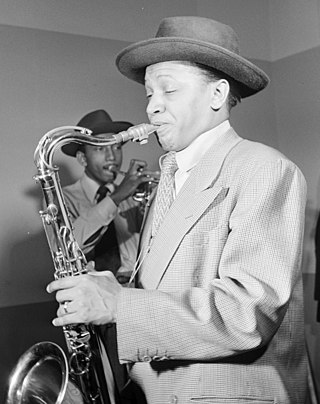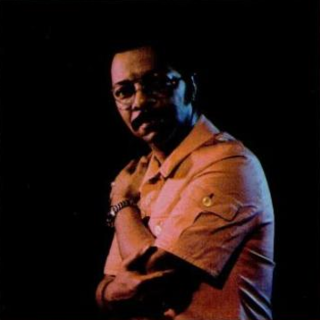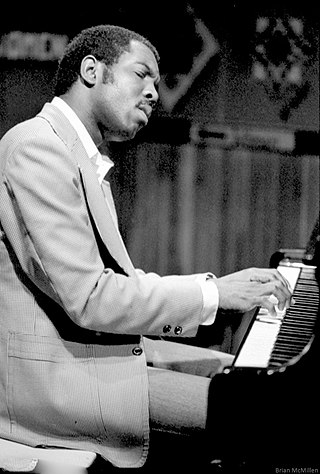Jerome Richardson was an American jazz musician and woodwind player. He is cited as playing one of the earliest jazz flute recordings with his work on the 1949 Quincy Jones arranged song "Kingfish".

Jean-Baptiste Illinois Jacquet was an American jazz tenor saxophonist, best remembered for his solo on "Flying Home", critically recognized as the first R&B saxophone solo. He is also known as one of the writers of the jazz standard "Don'cha Go 'Way Mad."

Oscar Pettiford was an American jazz double bassist and composer. He was one of the earliest musicians to work in the bebop idiom.
Grachan Moncur III was an American jazz trombonist. He was the son of jazz bassist Grachan Moncur II and the nephew of jazz saxophonist Al Cooper.

Kenneth Earl Burrell is an American jazz guitarist known for his work on numerous top jazz labels: Prestige, Blue Note, Verve, CTI, Muse, and Concord. His collaborations with Jimmy Smith were notable, and produced the 1965 Billboard Top Twenty hit Verve album Organ Grinder Swing. He has cited jazz guitarists Charlie Christian, Oscar Moore, and Django Reinhardt as influences, along with blues guitarists T-Bone Walker and Muddy Waters.

Raymundo "Ray" Barretto Pagán was an American percussionist and bandleader of Puerto Rican descent. Throughout his career as a percussionist, he played a wide variety of Latin music styles, as well as Latin jazz. His first hit, "El Watusi", was recorded by his Charanga Moderna in 1962, becoming the most successful pachanga song in the United States. In the late 1960s, Barretto became one of the leading exponents of boogaloo and what would later be known as salsa. Nonetheless, many of Barretto's recordings would remain rooted in more traditional genres such as son cubano. A master of the descarga, Barretto was a long-time member of the Fania All-Stars. His success continued into the 1970s with songs such as "Cocinando" and "Indestructible". His last album for Fania Records, Soy dichoso, was released in 1990. He then formed the New World Spirit jazz ensemble and continued to tour and record until his death in 2006. He is the father of American vocalist and saxophonist Chris Barretto, best known for his work with Periphery and Monuments.

Grady Tate was an American jazz and soul-jazz drummer and baritone vocalist. In addition to his work as sideman, Tate released many albums as leader and lent his voice to songs in the animated Schoolhouse Rock! series. He received two Grammy nominations.

John Carl Hendricks, known professionally as Jon Hendricks, was an American jazz lyricist and singer. He is one of the originators of vocalese, which adds lyrics to existing instrumental songs and replaces many instruments with vocalists, such as the big-band arrangements of Duke Ellington and Count Basie. He is considered one of the best practitioners of scat singing, which involves vocal jazz soloing. Jazz critic and historian Leonard Feather called him the "Poet Laureate of Jazz", while Time dubbed him the "James Joyce of Jive". Al Jarreau called him "pound-for-pound the best jazz singer on the planet—maybe that's ever been".

Larry Young was an American jazz organist and occasional pianist. Young's early work was strongly influenced by the soul jazz of Jimmy Smith, but he later pioneered a more experimental, modal approach to the Hammond B-3.

Frank Benjamin Foster III was an American tenor and soprano saxophonist, flautist, arranger, and composer. Foster collaborated frequently with Count Basie and worked as a bandleader from the early 1950s. In 1998, Howard University awarded Frank Foster with the Benny Golson Jazz Master Award.

Shirley Scott was an American jazz organist. Her music was noted for its mixture of bebop, blues, and gospel elements. She was known by the nickname "Queen of the Organ".
Richard Francis Wyands was an American jazz pianist, composer, and arranger, best known for his work as a side-man.

Salome Bey was a U.S.-born Canadian singer-songwriter, composer, and actress who lived in Toronto, Ontario, since 1966.

Jimmy Owens is an American jazz trumpeter, composer, arranger, lecturer, and educator. He has played with Lionel Hampton, Charles Mingus, Hank Crawford, Dizzy Gillespie, Count Basie, Herbie Mann, among many others. Since 1969, he has led his own group, Jimmy Owens Plus.

Joseph Barry Galbraith was an American jazz guitarist.
Victor Lewis is an American jazz drummer, composer, and educator.

James Williams was an American jazz pianist.

Harlem Bush Music is a compilation of two albums by saxophonist Gary Bartz NTU Troop, recorded in 1970 and 1971 and released on the Milestone label.

Benjamin Alexander Riley Jr. was an American jazz drummer known for his work with Thelonious Monk, as well as Alice Coltrane, Stan Getz, Eddie "Lockjaw" Davis, Ahmad Jamal, and as a member of the group Sphere. During the 1970s and 1980s he was a member of the New York Jazz Quartet.
Geraldine Bey de Haas is an American jazz singer and concert organizer.














